Mark Vipsanius Agrippa. In the shadow of Emperor Augustus
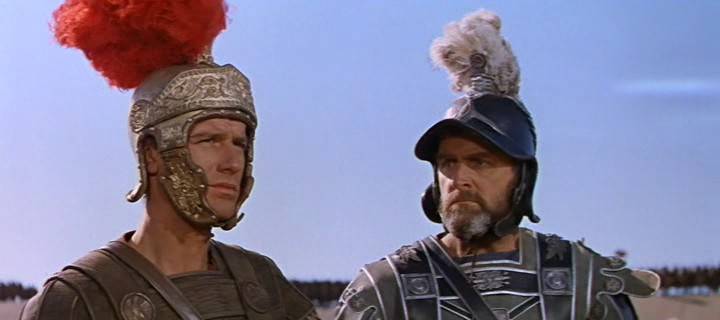
Andrew Keir as Agrippa (right) and Roddy McDowall as Octavian. Frame from the film "Cleopatra", 1963
Mark Vipsanius Agrippa is not well known even to people who are interested in history. When it comes to the tragic events that shook Rome to its foundation in the XNUMXst century BC. e. - the painful process of the agony of the republic and the formation of the principate, they remember first of all Pompey, Caesar, Brutus, Mark Antony, Cleopatra and Octavian. Few people remember, for example, Sextus Pompey, who is often dismissively called the leader of the Sicilian pirates (which is absolutely not true).
Mark Vipsanius Agrippa also remains in the shadows, the existence of which many learned only from the famous film Cleopatra in 1963 (and soon they safely forgot about this hero). Meanwhile, there is every reason to believe that without Agrippa, Octavian would never have become Augustus - "Great Pontiff, Consul 13 times, Emperor 21 times, endowed with the power of a people's tribune 37 times, Father of the Fatherland."
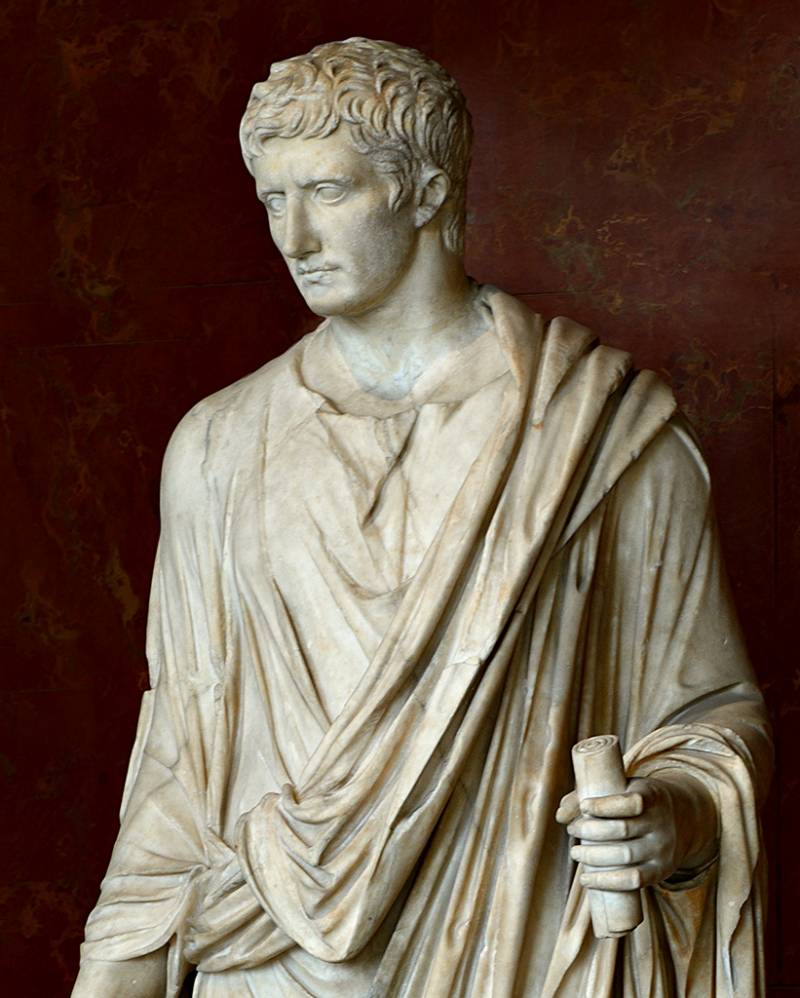
Octavian Augustus, Paris, Louvre
Contemporaries rated the activities of Agrippa extremely highly. So, for example, Virgil in the VIII book of the Aeneid claims that on the shield of Aeneas, which was forged for him at the request of Venus (the mother of the hero) by the god Vulcan, there was an image of Agrippa leading ships in the battle of Cape Actions (this picture is from the future of the readers of the poem didn't bother me for some reason).
And Octavian cannot be reproached for ingratitude and the desire to erase the memory of Agrippa, attributing to himself all his merits. He even ordered to bury him in his mausoleum. It's just that human memory is selective, and for each era it saves only a few names. But the hero of today's article will be Mark Agrippa, let's try to remember the main milestones of his life, achievements and successes.
Youth
The birthplace of Mark Vipsanias Agrippa is still disputed. Some believe that Perugia was his homeland, others speak of the Italian region of Latium, others that he was born in Istria, that is, on the territory of modern Croatia. It happened in 64 or 63 BC. e.
By the way, Pliny the Elder claims that the name Agrippa was given to children born "foot first" (with a breech presentation of the fetus). Agrippa's family was quite prosperous and belonged to the class of horsemen (equites). A friend of Agrippa, Gaius Octavius Furin, great-nephew of Gaius Julius Caesar, also came from a family of Equites. However, his family was Roman, not provincial, and considered more noble.
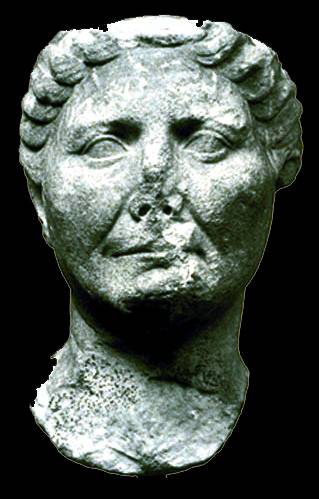
Atia Balba Caesonia, Caesar's niece and Octavian's mother
Octavius and Agrippa were in the army of Caesar during the war in Spain with Gnaeus Pompey the Younger (the eldest son of Pompey Magnus) and took part in the decisive battle of this campaign (Battle of Munda, March 17, 45 BC). At that time they were both about 17 years old. But the older brother of Agrippa, Lucius, was a Pompeian and fought against Caesar in North Africa at the Battle of Taps (April 6, 46 BC). He was captured and was forgiven by Caesar at the request of Octavius.
At the end of the war, Agrippa and Octavius went to study in Apollonia Illyria (this is the territory of modern Albania). The third in this company turned out to be the notorious Gaius Tsilny Maecenas, whose name would later become a household name - a representative of an ancient Etruscan family, also from the class of horsemen.
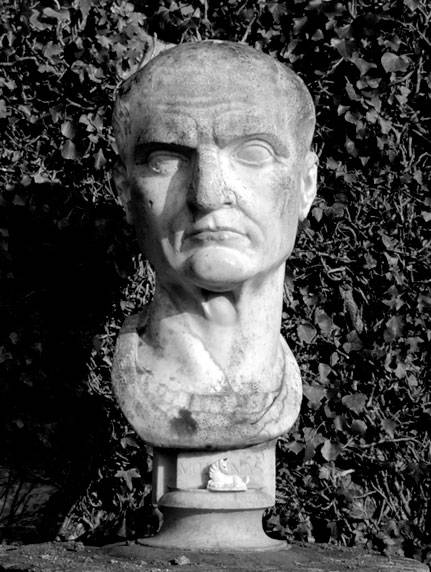
Maecenas
Just 4 months later, Octavius received news of the assassination of Caesar, as well as that it was his dictator who appointed him as his heir. The situation in Rome was so serious that even his mother and stepfather advised Octavius not to return home and not claim such a dangerous inheritance.
It is believed that it was Agrippa who convinced Octavius to join the struggle for power over Rome. Friends went to their homeland, where they learned that the entire state of Caesar was in the hands of Mark Antony, who was popular among the troops, had numerous supporters and, finally, was older and more experienced than the 19-year-old Octavius (at that time Antony was 39-42 years old) .
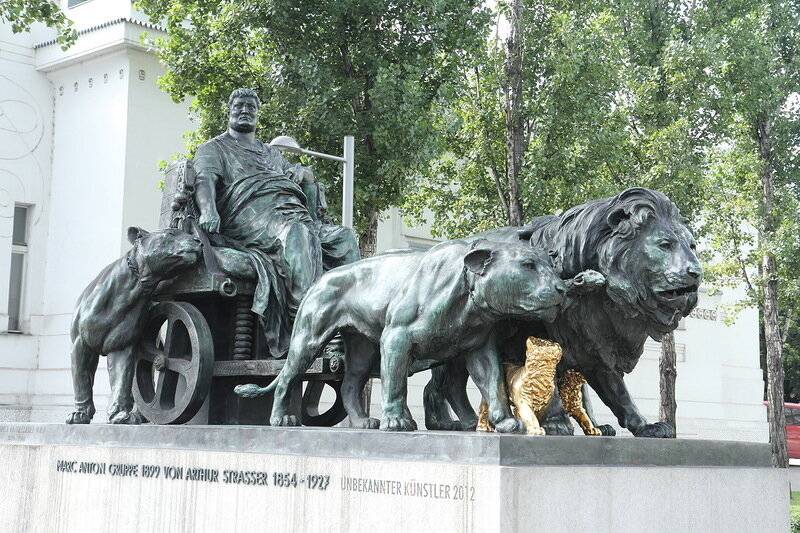
Mark Antony in a chariot drawn by lions. This sculptural composition was created by A. Strasser for demonstration at the World Exhibition in Paris (1900), now it can be seen in Vienna at the Secession Museum
But Octavius announced the entry into the rights of inheritance and took the name Gaius Julius Caesar Octavian. In order to fulfill the points of Caesar's will and arrange worthy games in his honor, he had to sell the estates of his mother and stepfather.
Support for the dictator's heir was provided by Cicero, whom Octavian would later "sacrifice" at the request of Mark Antony - in accordance with the agreement on the formation of the triumvirate. Antony, in turn, will sacrifice his maternal uncle, and Lepidus his brother.
Beginning of political and military career
Agrippa actively supported his friend. He was only 20 years old when he successfully acted as an accuser for Gaius Cassius Longinus, one of Caesar's assassins.
Senators then found themselves in a difficult situation. They wanted the restoration of the republic, but the power was on the side of the pretenders - Mark Antony and Octavian, each of whom had legions loyal to them. Some of those who were on the side of Octavius, Agrippa brought from Greece, two more, thanks to skillful agitation, went over to his side from the army of Mark Antony.
The rehabilitated Sextus Pompey, appointed to command the Republican fleet, having moved from Spain to Massalia (Marseille), he waited, observing neutrality (and eventually waited for his outlaws to be declared).
And in Italy, the Mutinskaya war began, in which the Senate tried to resist both Mark Antony and Octavian, who, in turn, fought against each other. In the autumn of 44 B.C. e. Anthony, at the head of four legions, began hostilities in Cisalpine Gaul, in November he laid siege to Mutina (Modena), where the governor of this province, Decimus Brutus, was located.
But on April 21, 43 BC. e. Antony's army was defeated by the troops of Octavian and the consul Aulus Hirtius. Antony retreated to Narbonne Gaul, whose governor was his ally Marcus Aemilius Lepidus. But both consuls died in this war, and a “power vacuum” formed in Rome. Nevertheless, the senate categorically refused to appoint Octavian as the new consul.
But the senators still had to do it in August 43 BC. e. after Octavian entered Rome. In addition, the Senate decided that Mark Antony was more dangerous than his young and inexperienced competitor.
However, on November 27 of the same year, Octavian and Antony, through the mediation of Mark Lepidus, unexpectedly for everyone, agreed on an alliance for 5 years. So the Second Triumvirate was formed, and the republican lands were divided into three parts: Mark Antony received the eastern provinces, Lepidus - North Africa. Octavian - Italy (later, under an agreement concluded in Brundisium, he annexed Spain and Gaul to his possessions).
The killers of Caesar and those who sympathized with them were outlawed, many noble Romans were killed, even more fled to Sicily to Sextus Pompey (among them was even Octavian's future wife, Livia Drusilla). September 42 B.C. e. Agrippa was in the army of the triumvirs during the famous battle of Philippi, in which Brutus and Cassius were defeated. However, already in the summer of 41 BC. e. a new civil war began - the Perusian, in which Octavian's opponents were the wife of Mark Antony Fulvia and the consul Lucius Antony, brother of the triumvir. One of the commanders in the army of Octavian was the 22-year-old Agrippa.
As a result, the troops of Lucius and Fulvia, blocked in Perusia, surrendered in the spring of 40 BC. e. In the summer of that year, Mark Antony, albeit belatedly, nevertheless appeared in Italy and laid siege to Brundisium, but the veterans of the opposing armies recognized and greeted each other. This forced the triumvirs to conclude a new agreement, one of the points of which was the marriage of Mark Antony with Octavian's sister.
They say that it was Agrippa and Maecenas who organized the personal meeting of the triumvirs. Upon his return to Rome, Agrippa received the position of city praetor and the right to govern Rome in the absence of Octavian. At that time, among Octavian's close associates, Maecenas and Agrippa enjoyed the greatest influence.
However, later Maecenas withdrew from political affairs (although he retained friendly relations with Octavian and influence on him), and Agrippa became the second person in the state. In the meantime, in 39 (according to other sources - in 38) BC. e. Agrippa, who was about 25 years old, received the management of Transalpine Gaul. Here he fought with the Germans, crossed the Rhine, and resettled on the left bank of this river the tribe of Ubiy who turned to him for help. The main city of the Ubii was later called "Agrippina's Colony", now known as Cologne. In addition, Agrippa crushed the revolt of the Aquitanes. In 37 BC. e. he was elected consul - despite the fact that the age limit of 43 was set for this magistracy.
Agrippa vs. Sextus Pompey
And this time, the situation on the sea lanes of Rome again escalated. Declared by the triumvirs in 43 BC. e. outlaw Sextus Pompey moved to Sicily, which he turned into a base for a powerful fleet. Both slaves and aristocrats included in the proscription lists fled to him from Italy. The admirals of the Sicilian fleet and the captains of the ships often became former pirates, once defeated by the father of Sextus - Pompey the Great. Pompey's ill-wishers even called the chief admiral of the Sicilian fleet, the freedman Menodorus, a former pirate.
Having won a number of victories, Sextus Pompey began to call himself the son of Neptune and wear a sea-green toga. At the same time, in the eyes of the Romans, he was not a marginal and the leader of a gang of robbers, but a very respected person, the son of one of the most popular political figures - Gnaeus Pompey the Great. Many expected Sextus Pompey to return to Rome and become dictator.
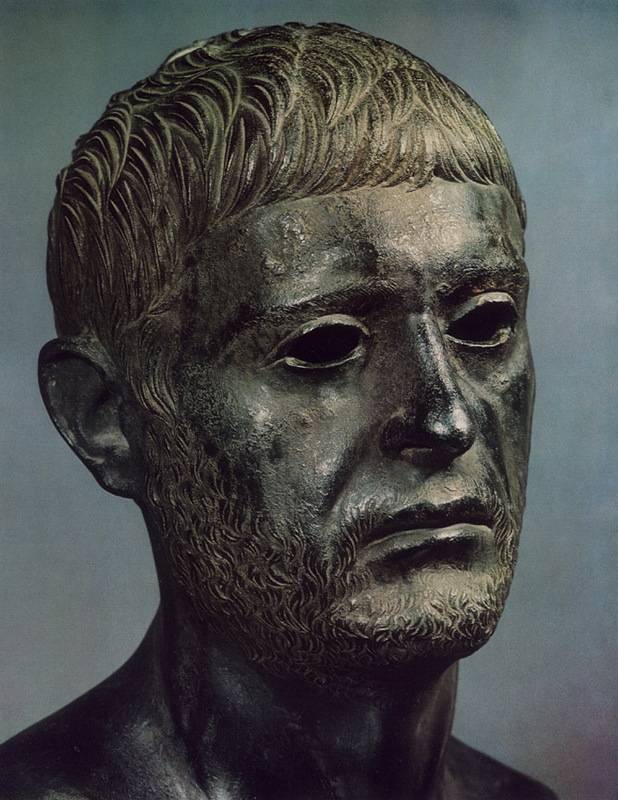
Possible portrait of Sextus Pompey
Unable to resist Sextus Pompey at sea, the triumvirs in February 39 BC. e. were forced to conclude the Treaty of Mizena, according to which Pompey received not only Sicily, but also Sardinia, Corsica and Achaia in his possession, promising in return to stop accepting fugitive slaves and ensure unhindered delivery of grain to Italy. However, Pompey continued to accept fugitive slaves, and Octavian accepted one of the main employees of his rival, Menodorus, who gave him Sardinia and Corsica, three legions stationed on these islands, and ships subordinate to him.
Mark Antony retired from the fight and even advised Octavian not to accept Menodorus. However, in 38 B.C. e. Octavian began fighting in 36 BC. e. another triumvir, Lepidus, joined him. Antony gave Octavian 120 of his ships, exchanging them for 20 soldiers.
In 38 BC. e. the traitor Menodorus defeated the Sicilian fleet in a naval battle at Cum. But then Pompey managed to win the battle at Scilleus, and then a storm broke out that drowned many Roman ships. After this failure, Gaius Calvisius Sabinus, commander of the Roman fleet, was sent to administrative work in Italy. Correct the situation from Gaul in 37 BC. e. Mark Vipsanius Agrippa was summoned.
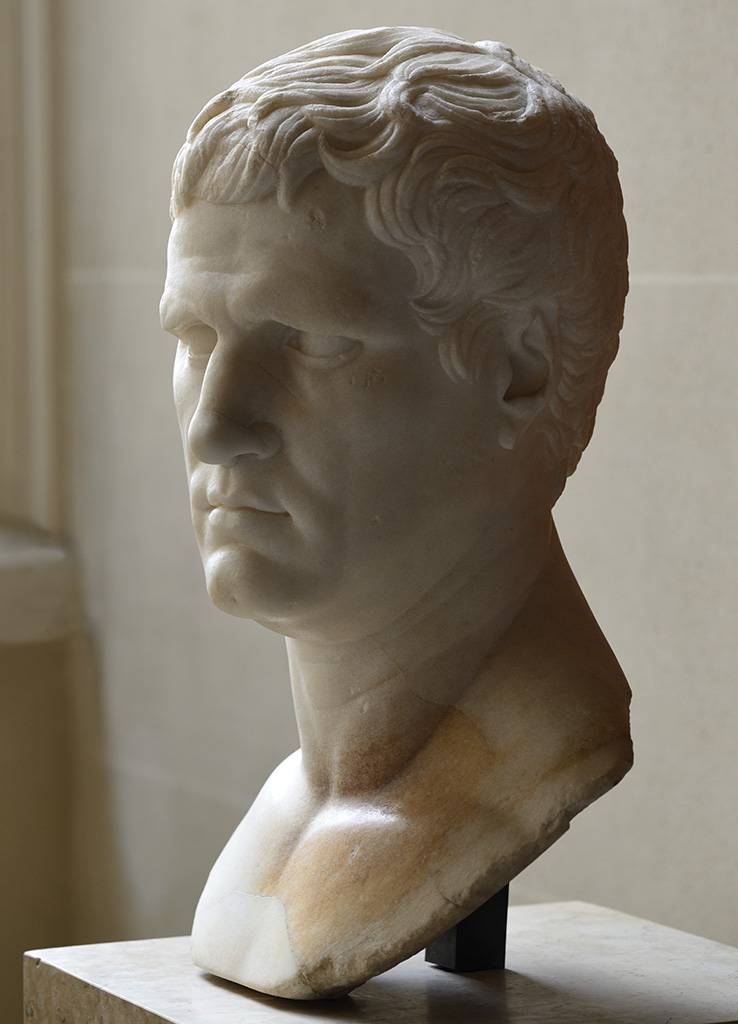
Mark Vipsanius Agrippa, marble bust, circa 25–24 AD BC e. Louvre
He began his activities with the construction of a naval base in Mizen. For this, a canal was dug, connecting the Lucrino and Avernian lakes with the sea. At that time, light ships formed the basis of the fleets of Sicily and Rome, while Pompey's crews were much better prepared, and therefore his skillfully maneuvering squadrons had an advantage during battles. Realizing this, Agrippa decided to give Pompey an "asymmetric answer": he ordered the construction of ships of a new type - large and heavy, capable of taking on board a large number of soldiers.
Already in August 36 BC. e. in the battle of Mila, the Romans lost only 5 ships, their opponents lost 30, including the flagship, and Admiral Demohar, who was on it, had to swim to another ship. Returning to Sicily, Pompey said that the battle with the new Roman ships was more like storming fortresses.
But this was not enough: Agrippa's ships received fundamentally new devices for naval combat - harpags or harpaxes (harpax). They were heavy bars with a hook at the end. They were fired with the help of ballistas and, like harpoons, got stuck in the sides of enemy ships. After that, small ships were raised above the water with the help of blocks, larger ships were pulled up and, taking advantage of the number of soldiers stationed, were boarded.
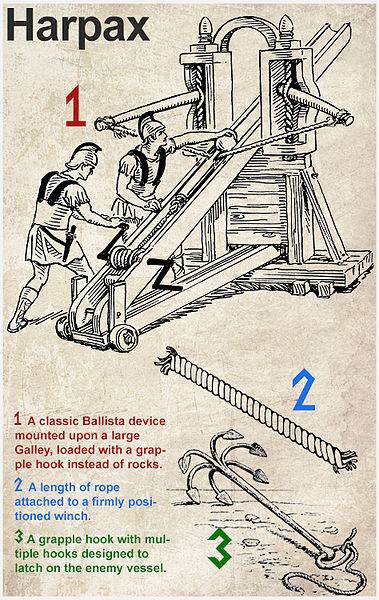
Harpax, modern reconstruction
The use of harpaxes by the Romans in the decisive naval battle near Navlakh (September 3, 36 BC) had a huge impact on the outcome of this battle. The crews of Pompey simply did not have the means to quickly kill them. Only later were special sickle-shaped blades mounted on long handles invented. In the meantime, it was only possible to row with all your might, giving reverse, which did not always help.
The defeat of the fleet of Sextus Pompey was crushing. Of the 180 ships he had left only 17, Admiral Demohar, in order not to be captured, committed suicide. One of Pompey's two land armies, commanded by Thysien Gallus, folded weapon. Pompey still had eight legions of Lucius Pliny Rufus in western Sicily at his disposal, but he had already abandoned the fight and sailed east. At first, he wanted to surrender himself under the protection of Mark Antony, but, having learned about the defeat of the army of this triumvir from the Parthians, he tried to seize part of his possessions. As a result, he was defeated, surrendered, and in 35 BC. e. executed by order of the governor of Asia, Mark Titius.
Agrippa for the victory in the battle of Navlach was awarded the "marine crown", in which he was depicted on coins.
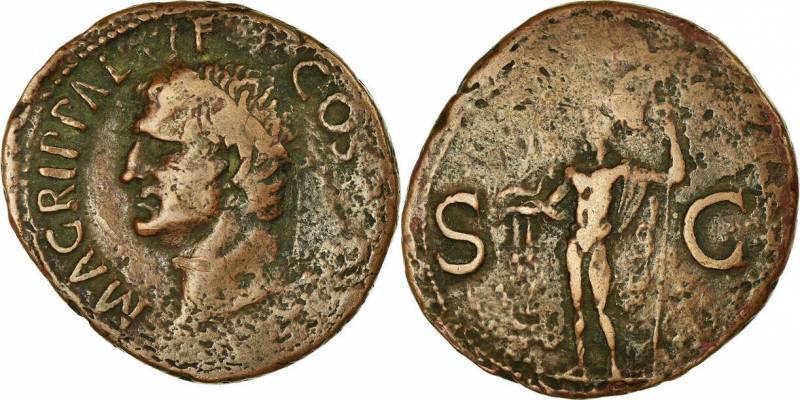
Agrippa on a Roman bronze coin
In the next article, we will continue and finish the story of Mark Vipsanias Agrippa.
Information